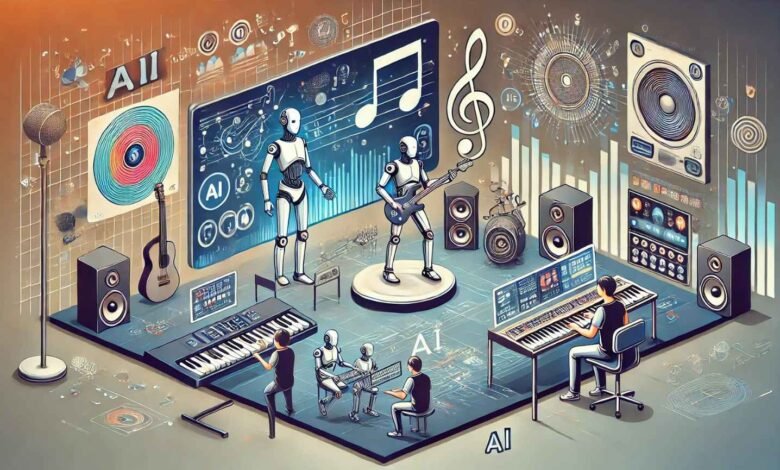How AI Is Revolutionizing Music Composition

Artificial intelligence is reshaping the music world, enabling the creation of melodies in ways never imagined. Tools like text-to-music generators transform written ideas into captivating soundscapes, empowering musicians, composers, and enthusiasts to explore new creative horizons.
AI × Music
AI’s journey in music began with algorithms analyzing patterns. Over time, these systems evolved to compose music in styles ranging from classical to contemporary. Today, AI tools help professionals and amateurs alike overcome creative barriers and expand beyond traditional music-making. AI acts as an active collaborator, suggesting harmonies or improvisations that inspire new ideas, allowing artists to explore uncharted creative territories.
AI-powered tools have also democratized music creation. Even individuals with no formal training can use intuitive platforms to produce complex compositions. These tools break down traditional barriers, enabling anyone with a passion for music to bring their ideas to life. Additionally, AI streamlines tasks like arranging, mixing, and mastering, saving time for musicians to focus on the artistic aspects of creation.
Text-to-Music AI Generators
One of the most exciting developments in AI music composition is the rise of text-to-music generators. Tools like Adobe Express text to music generator ai allow users to input written ideas or text descriptions and convert them into full musical compositions. These platforms open up entirely new possibilities for creators, enabling anyone to turn their words into melodies, harmonies, and full-fledged musical pieces without needing extensive musical knowledge.
Text-to-music generators not only provide instant creative output but also inspire experimentation. Whether you’re looking to score a video, create background music for a project, or explore new genres, these tools offer a simple yet powerful way to bring your written concepts to life in a musical form. As AI continues to evolve, the potential for such tools to revolutionize how we create and experience music will only grow.
Applications of AI in Music
AI’s versatility spans various aspects of the music industry:
- Music Generation: Tools like OpenAI’s MuseNet and Google’s Magenta create original compositions in diverse genres.
- Remixing and Arranging: AI remixes tracks or rearranges pieces in different tempos, styles, or instrumentation.
- Sound Design: AI crafts unique sounds and effects, enabling creators to experiment with innovative sonic textures.
Aspiring musicians also benefit from AI-driven educational tools, which help them learn theory, practice instruments, and receive real-time feedback. These applications showcase how AI supports both professional musicians and beginners in honing their craft.
Challenges in AI-Driven Music
While AI opens new opportunities, it also introduces challenges. Ethical concerns about ownership and authenticity of AI-generated compositions remain hotly debated. Some purists argue that AI lacks the emotional depth and soul of human-created music, raising questions about its role in the industry. Rather than replacing human musicians, AI should be seen as an enabler—enhancing creativity and expanding possibilities rather than diminishing the value of human artistry.
The Future of AI in Music
AI’s role in music composition is still in its infancy, but its potential is immense. Imagine humming a tune and having AI transform it into a symphony or turning simple written ideas into rich, layered harmonies. These innovations promise to democratize music creation, making it more inclusive and accessible than ever before.
How to Get Started with AI in Music
If you’re curious about exploring AI in music, here are a few tips:
- Research Platforms: Popular options like Amper Music, AIVA, and Soundraw offer tools tailored to different needs.
- Experiment with Free Trials: Test features and capabilities to find what works for your creative goals.
- Combine Ideas: Use AI as a collaborator to enhance your compositions with its unique suggestions.
- Learn Music Basics: Familiarity with music theory can help you unlock the full potential of AI tools.
AI is not just a trend but a transformative force in the music industry. By embracing these innovations, musicians and creators can unlock unprecedented creative potential. Whether you’re a seasoned composer or a curious beginner, now is the time to explore how AI can enrich your musical journey.


